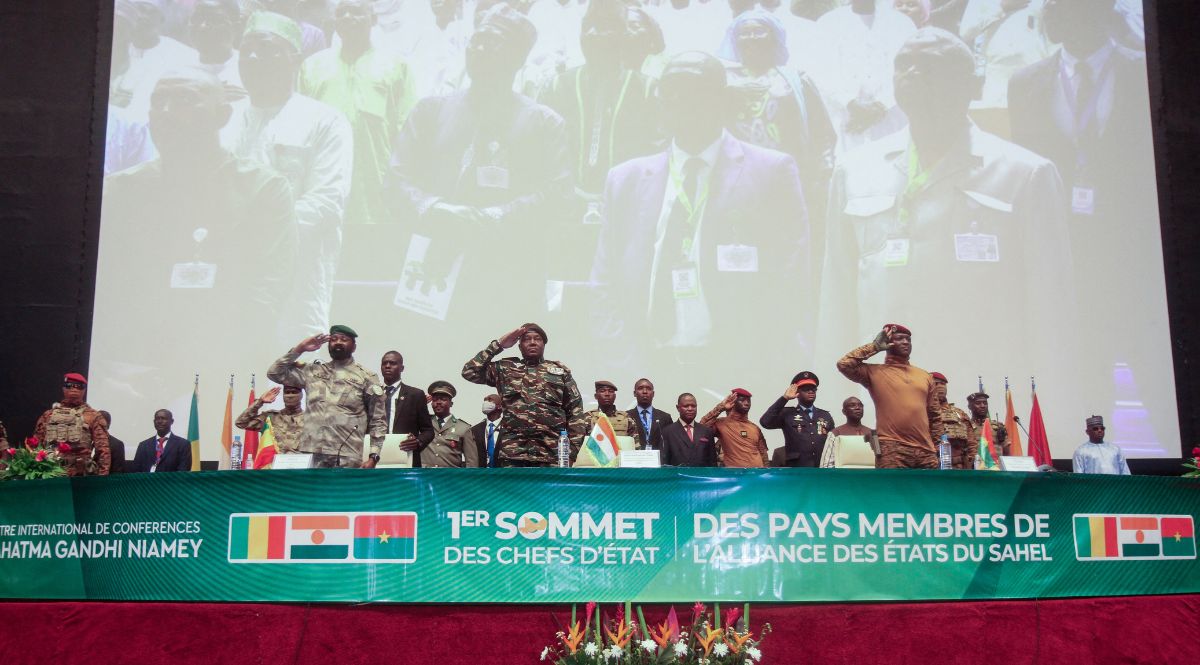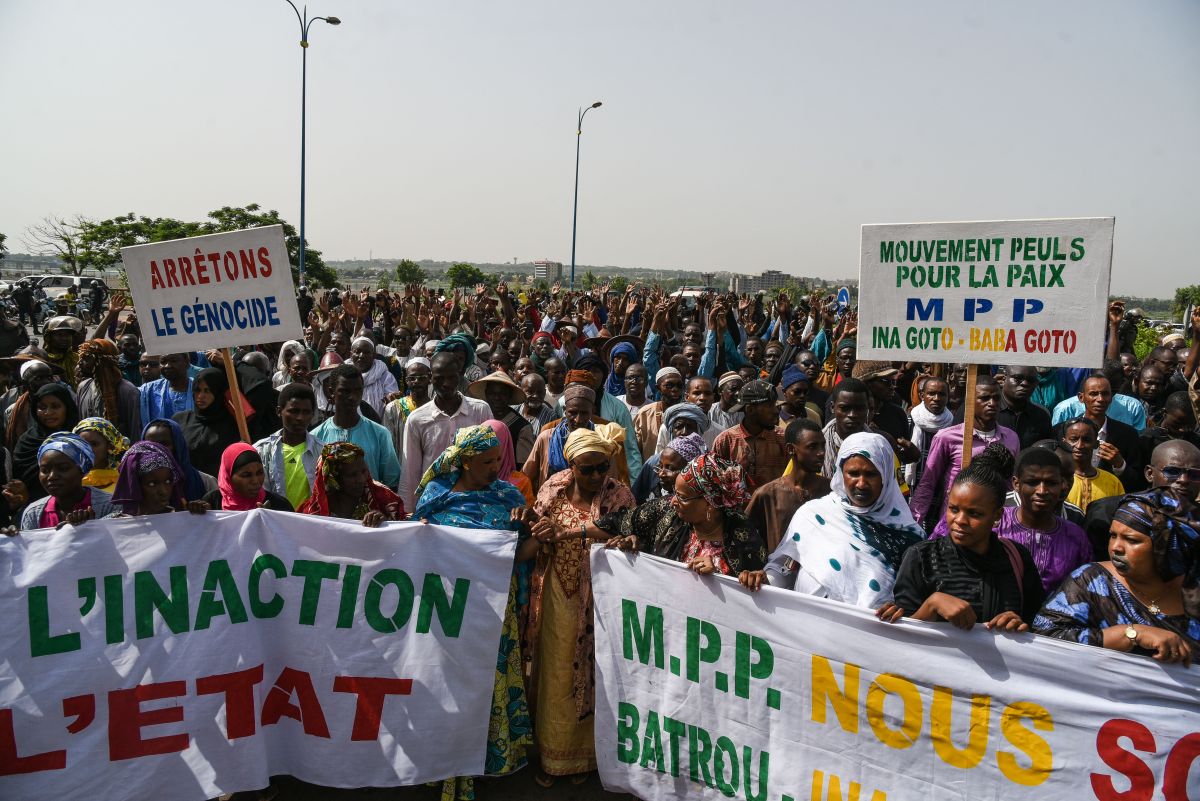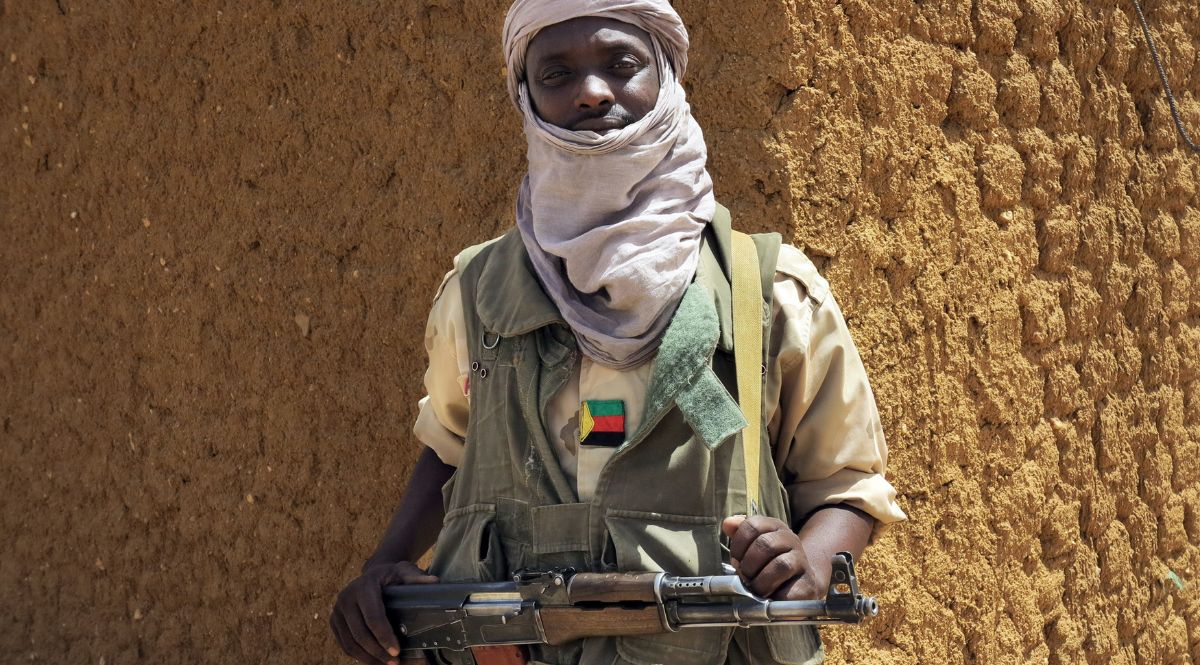Junta-led Confederation of Sahel States Challenges ECOWAS
At a summit in July, the leaders of Mali, Burkina Faso, and Niger announced a confederation of the three countries. It is aimed at transforming the ad hoc cooperation of the populist and anti-Western military juntas into an alternative to the existing models of integration in the region, especially the pro-Western economic bloc ECOWAS. Russia sees it favourably as an opportunity to further weaken Western influence in Africa.
 Mahamadou Hamidou / Reuters / Forum
Mahamadou Hamidou / Reuters / Forum
Integration within the Alliance of Sahel States
Burkina Faso, Mali, and Niger are neighbouring states located in the semi-arid Sahel (and partly in the Sahara), linked by historical, ethnic and cultural ties. Since 1970, they have cooperated in the management of natural resources under the Liptako-Gourma Authority, an organisation whose name refers to the pre-colonial state located at the interface of their borders, the 19th-century emirate of Liptako. Being among the least developed, poorest countries in the world, they share common problems: the weakness of state structures, the barrenness of agricultural land, and, in the last decade, the rise of Muslim extremism. A new context for their cooperation has been the seizure of power in all three countries between 2020 and 2023 by populist military juntas. They have broken off military and political cooperation with France, moving closer to Russia, combining revolutionary sovereigntist and pan-Africanist rhetoric with a reluctance to cede power to civilians. In February 2023, the prime minister of Burkina Faso’s military government came out with a “flexible federation” initiative, inviting Mali and Guinea (also ruled by a military putschist, though not anti-Western). The latter was eventually replaced by Niger, which adopted policies and rhetoric modelled on those of Mali and Burkina Faso after last July’s coup.
On 16 September 2023, the military governments of Mali, Burkina Faso, and Niger signed the so-called Liptako-Gourma Charter establishing the Alliance of Sahel States (AES). Its signatories pledged military assistance in the event of a “rebellion” or “foreign aggression”. In the following months, cooperation was extended to the information space, including joint media projects, but also coordination of public messaging. This was to control criticism that undermines the legitimacy of the military leadership. The leaders signalled the desire of the AES to withdraw from the CFA franc monetary union, the currency used in eight West African countries, pegged to the euro, a symbol of French influence. The states initiated a number of economic integration projects, such as a denser network of air links within the AES. As part of their military cooperation, they established a joint counter-terrorism force, which was announced in March 2024, and in August, after Malian-Russian forces were routed in Tinzaouaten on the Mali-Algerian border by Tuareg rebels, a retaliatory airstrike was launched from Burkina Faso territory. A symbolic deepening of integration was the establishment of a confederation in July (it will retain the acronym AES), for the time being without common institutions, to be defined in the coming months.
Regional and International Context
The military juntas formed the AES both under the influence of common interest (notably securing their rule) and in opposition to the Economic Community of West African States (ECOWAS), a pro-Western bloc comprising 15 countries in the region. After the coups, ECOWAS imposed sanctions on the putschists and pushed for the transfer of power to civilians. In an atmosphere of declining credibility for ECOWAS, which was accused of double standards (e.g., forbearance towards pro-Western authoritarians) and subservience to EU states, these steps had the effect of consolidating public support for the military rulers. The AES defensive alliance was formed in response to the threat of military intervention by Nigeria, Benin, and Senegal on behalf of ECOWAS. On 28 January, the three junta-ruled countries in a joint statement announced their unilateral exit from the West African bloc. By holding their own summit at which they formalised the confederation, in parallel to the ECOWAS convention in July, they confirmed that they want to create an alternative project to the bloc and attract more states (e.g., Chad) into their orbit.
The military juntas’ ties with Russia play a large role in consolidating the bloc. All three countries host Russian mercenaries from the Africa Corps (the former Wagner Group) on their territories and support Russia politically. For Russia, in turn, the success of the AES as a separate, friendly, authoritarian bloc influencing its neighbours offers numerous benefits, such as giving credence to its call for multilateralism. By giving the rebels military and economic support, Russia gains influence over the decisions they make, for example, by breaking off (as Mali and Niger did in August) diplomatic relations with Ukraine.
Threats to the Confederation
Although the AES opens up further areas of integration, it is based mainly on a commonality of ad hoc interests between its military leaders rather than on the strength of common institutions, an established supranational identity, or regional successes. Withdrawal from ECOWAS means more difficulties for the people of the new confederation: they lose, for example, their freedom of movement within the grouping’s territory. The prolonged isolation of the juntas, especially their dispute with Benin, through which runs the only export route for oil extracted in Niger, limits the possibilities for economic stabilisation of the AES.
For the survival of the military governments of Mali, Burkina Faso, and Niger and the political project they are creating, the most important challenge is the threat from armed jihadist groups. The overthrow of the civilian authorities and the expulsion of French, UN, and U.S. forces and their replacement by Russian mercenaries have reduced the juntas’ abilities to counter the extremists. As a result, the security situation is deteriorating in all three countries. This, in turn, threatens the stability of the juntas—by failing to deliver on the promise of victories against the extremists, they risk a mutiny by some officers who will not want to continue their policies.
The growing sense of insecurity is resulting in increasing authoritarianism and repression of criticism, which erodes popular support. The juntas’ fears of externally directed sabotage are not all unfounded. Some ECOWAS countries and, for example, France would welcome the collapse of the AES project. Burkina Faso’s leader accused Côte d'Ivoire and Benin of hosting—with French participation—armed groups hostile to his government, while the Mali authorities see a similar threat from Algeria.
Conclusions
The establishment of the AES confederation is an attempt to consolidate the cooperation of the three military governments, which have gained popularity by matching rhetoric (e.g., anti-French) with public sentiment. However, they are subject to increasing internal and external pressure. Consequently, the survival of both the individual juntas and the bloc they form is uncertain. Nevertheless, the AES states as well as their allies, especially Russia, are taking steps to strengthen the foundations of the confederation. This is being done, for example, by establishing in Niger a school to train engineering cadres in the oil sector (heralding a shift away from multinationals) or processes to reform the mining sector and increase revenues it provides.
The most important factor governing AES cooperation remains the desire of their military leaders to retain power. This may not be enough in the face of the growing jihadist threat and citizen dissatisfaction with the deteriorating security. The defeat of Russian mercenaries on the Malian-Algerian border has exposed the weakness of the alliance with Russia. This will increase internal discussions about the correctness of the course taken. To deflect attention from the problems, the AES governments will take more confrontational steps in the symbolic sphere, such as further limiting contacts with partners accused of fostering conspiracies hostile to them or considered to represent the so-called collective West. These could include states maintaining a military presence in the region, such as Italy, or those active in the development-and-standards transfer sphere, such as Japan.
For the EU, the solidification of the AES confederation as an anti-democratic, pro-Russian, ECOWAS-shattering bloc is a highly undesirable prospect. However, the EU should not support ad hoc actions that weaken the junta governments, such as sabotage, as this would mainly benefit the jihadists. Instead, it should maintain the capacity of European governments to keep working relations with Mali, Burkina Faso, and Niger, and skilfully communicate the risks and dangers that cooperation with Russia exposes these states to. On the political field, the EU’s most important partner vis-à-vis the AES may be the West-critical but pragmatic Senegal, currently the only state capable of persuading the military juntas to correct their course. It has been accepted by the AES as a mediator in the dispute with ECOWAS. Reducing negative trends in the Sahel will require a new impetus for EU engagement in the region, which weakened after the EUTM military training mission in Mali and the EUCAP Sahel advisory mission in Niger ended in 2024.




.jpg)
